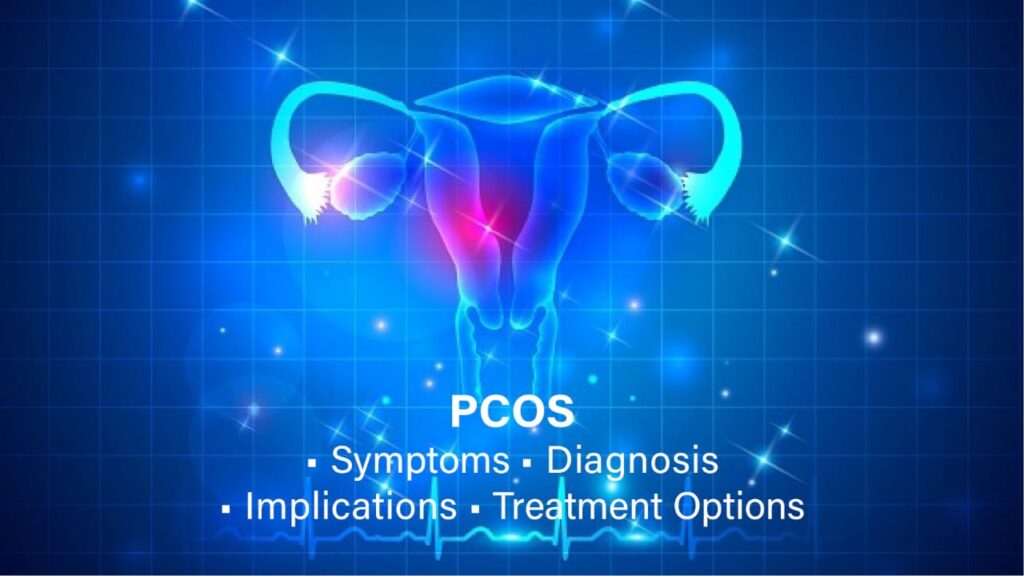What is PCOS?
PCOS denotes polycystic ovarian Syndrome. It affects adolescent girls and women in reproductive age groups. It is fairly common and may affect 1 in 10 women in reproductive age groups (15-45 years). It is a disorder of the function of ovaries, wherein ovaries produce slightly more of the hormones called androgens (male-like hormones), and develop multiple fluid filled cysts. These cysts represent immature follicles which do not release eggs regularly (ovulation).
Why Does Pcos Happen?
The exact cause of PCOS is unknown. Lot of research is going on to know the exact pathophysiology. What is known about PCOS pathophysiology is that it is largely genetically determined, that is, the affected women are born with a tendency to develop PCOS. However, environmental factors like unhealthy eating and sedentary lifestyle leading to weight gain further exacerbate the manifestations of PCOS.
How to Identify Symptoms?
The common symptoms of PCOS include irregular periods, acne, excessive hair growth over upper lips or chin, excessive scalp hair loss and difficulty in conceiving. Generally, periods start getting irregular soon after menarche (beginning of the first period), but in some women they may remain normal for few years. Any gap of more than 35 days or less than 21 days between the periods is considered significant irregularity. Some women may have prolonged gaps of 3-4 months or fail to have periods unless given medications. Some women may also have prolonged spotting or prolonged bleeding. Many women suffer from acne and unwanted facial hair growth over upper lips and chin requiring frequent threading or waxing. Most women with PCOS have a tendency to gain more weight which, in-turn, worsens their symptoms.
Implications:
PCOS has important implications in a woman’s life. Irregular periods are certainly concerning. Acne and excessive facial hair growth have definite cosmetic concerns which, along with weight gain cause body-image issues to some women. They may face difficulty in conceiving and sometimes use of assisted reproductive techniques may be required. Apart from this, women with PCOS have more tendency to develop diabetes, high blood pressure, high cholesterol and heart disease in the future.
How is Pcos Diagnosed?
If you have irregular periods, excessive facial hair or acne, you should visit your endocrinologist. Your doctor will advise certain hormonal blood tests. An ultrasonography of the ovaries may also be advised. Additionally, certain metabolic blood tests like sugars, cholesterol and liver profile are necessary.
Treatment:
Optimum treatment of PCOS begins with lifestyle modifications, healthy eating and regular exercises. Weight loss definitely helps to alleviate symptoms of PCOS. So, the importance of maintaining healthy weight cannot be overemphasized. Oral contraceptive pills are the most effective hormonal treatment for PCOS. Some medications which oppose the action of androgens are sometimes prescribed. These medications can have some side effects, hence, careful discussion with your doctor is required. Women with PCOS who are planning pregnancy should meet their gynaecologists as sometimes, treatment may be required to help them conceive. Additionally, these women have higher chances of developing high blood sugars or blood pressure during pregnancy. Trustwell Hospitals provides the Best infrastructure and Doctors to treat PCOS conditions.
Conclusion:
PCOS is a common problem in young women. Irregular periods, acne, excessive facial hair growth and difficulty in conceiving are common symptoms. Women with PCOS are at risk of developing diabetes, blood pressure and heart disease in the future. Consultation with your doctor is required for establishing the diagnosis and initiation of effective treatment.
